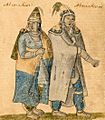Abenaki language facts for kids
Abenaki, also called Abnaki, is an Algonquian language. It is spoken by the Abenaki people in Quebec, Canada, and the northern parts of New England in the United States. This language is considered endangered, meaning very few people still speak it.
The Abenaki language has two main forms: Eastern Abenaki and Western Abenaki. These forms have different words and sounds. Sometimes, people even think of them as separate languages.
Eastern Abenaki was spoken by several Native American groups. These included the Micmac, Maliseet, Passamaquoddy, and Penobscot peoples. They lived along the coast of Maine. The last person who spoke Eastern Abenaki (Penobscot) fluently passed away in the 1990s. However, some older Penobscot people still speak it. There are ongoing efforts to teach and save this language in local schools. Today, only a few people still speak Western Abenaki.
Contents
What is the Abenaki Language?
The Abenaki language is part of a larger group of languages called Algonquian. Many Native American tribes across North America speak Algonquian languages. The Abenaki language helps connect the Abenaki people to their history and culture.
Eastern Abenaki Speakers
Eastern Abenaki was once spoken by many different tribes. These tribes lived in what is now Maine. They included the Micmac, Maliseet, Passamaquoddy, and Penobscot people. Each tribe had its own way of speaking Eastern Abenaki.
Western Abenaki Speakers
Western Abenaki was spoken by Abenaki communities further west. These communities were mainly in Vermont, New Hampshire, and Quebec. Today, only a small number of people still speak Western Abenaki.
Why is Abenaki Endangered?
Like many Native American languages, Abenaki became endangered over time. This happened for several reasons. For example, many Abenaki children were not taught their language. Instead, they learned English or French. This made it harder for the language to be passed down through families.
Efforts to Save the Language
Even though Abenaki is endangered, people are working hard to save it.
- In Penobscot communities, older people are teaching the language to younger generations.
- Schools are starting programs to teach Abenaki.
- People are creating dictionaries and learning materials.
- These efforts help keep the language alive for future Abenaki children.
Images for kids
See also
 In Spanish: Idioma abenaki para niños
In Spanish: Idioma abenaki para niños
 | Shirley Ann Jackson |
 | Garett Morgan |
 | J. Ernest Wilkins Jr. |
 | Elijah McCoy |


